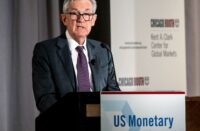Charley Ellis, a trailblazer in index investing, maintains that the fundamentals that led to the prosperity of index funds still hold: “Outperforming the market is virtually unachievable,” he shared with CNBC’s Bob Pisani on a recent episode of “ETF Edge.” Ellis further cautions of another obstacle equivalent to the enduring subpar performance of active management that deters numerous investors: You may be your biggest adversary concerning your investment plan.
The intricate nature of the market, its unpredictability, and an endless array of other factors can lead to erratic price shifts. However, your individual mindset is equally crucial among these factors that can derail your financial portfolio. In his latest book, “Rethinking Investing,” Ellis sheds light on a variety of subconscious biases that influence our perception of money in the market. Some of the significant biases he discusses in the book include:
– The gambler’s fallacy: The presumption that if you were successful in selecting one stock, you will succeed with all other stocks.
– Confirmation bias: The tendency to seek information that supports pre-existing beliefs.
– Herd mentality: The inclination to blindly follow the actions of a larger group.
– Sunk cost fallacy: The tendency to continue investing in failing investments.
– Availability: The propensity to be swayed by easily available information, regardless of its actual worth.
Ellis asserts that the effects of these biases on your portfolio strategy can be significant, prompting investors to reassess their approach to the market. “Instead of attempting to gain more, strive to pay less,” he advised. “That’s why ETFs… have proved to be such a sensible choice.”
Studies suggest that ETFs generally have lesser fees than conventional actively managed mutual funds. Nevertheless, traditional index mutual funds like S&P 500 funds from Vanguard and Fidelity also have extremely low fees, with some even being management fee-free. Ellis contends that the utilization of lower fee funds, coupled with abandoning our behavioral biases, can assist investors in succeeding in the long run. “They’re mundane, so we tend not to meddle with them, and in the end, they yield very, very substantial results,” he stated.
Long-time ETF specialist Dave Nadig, who joined Ellis on “ETF Edge,” concurred. Nadig pointed out the blunder many investors make by trying to outperform the market through timing, only to outwit themselves. “If you miss the 10 best days in the market and also the worst 10 days, you’re still much worse off than if you simply stayed invested,” Nadig explained.
Lastly, Ellis provided an additional mindset alteration tip for investors aiming for a secure retirement: Begin viewing the income stream from Social Security in a fresh light.
Disclaimer: This article is meant to provide general information and does not constitute financial advice. Always do your own research or consult with a professional before making investment decisions.




